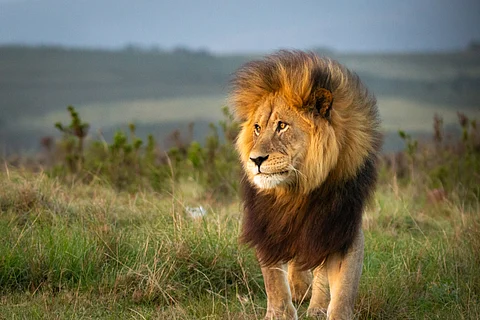

South Africa has become the world’s largest exporter of big cats and their body parts, with a thriving yet poorly regulated industry enabling illegal trade, according to a new report by global animal welfare organisation Four Paws.
More than 3,500 live big cats and 34,000 body parts were exported from South Africa over the past two decades, revealed the report based on data from the Convention on International Trade in Endangered Species of Wild Fauna and Flora (CITES).
Between 2018 and 2024, at least 30 incidents of illegal trade and trafficking of big cats — including lions, tigers, and leopards, along with their derivatives — were recorded, allegedly originating from South Africa, according to CITES.
Focusing on tigers alone, analyses showed that between 2000 and 2018, parts and products of at least 2,359 tigers were seized in 1,142 incidents across 32 countries and territories, the report noted.
Despite available figures, the precise number of big cats and their traded body parts exported from South Africa remains unknown due to a lack of data, regulation, and authorities’ failure to record how many tigers are held, bred, killed, traded, or transferred within their jurisdiction.
Some facilities claimed to self-regulate.
Ineffective regulation of the big cat industry in South Africa, especially concerning non-native species, has created a lucrative environment for criminal networks, the paper stated. They can now kill and process big cats within South Africa and traffic their parts back to Asia.
Unlike other endangered species, the big cat trade operates with a largely unmonitored animal supply, known only to breeders themselves, the report said.
In a recent case this year, the report cited the arrest of a South African and a prominent Vietnamese trafficker for attempting to sell six lions illegally.
Tracking illegal wildlife trade routes, the report identified Asia, particularly China and Vietnam, as hotspots.
“During the research phases in 2023 and 2024, Four Paws identified 19 other suspected wildlife traders with links to networks mentioned above. These traders were located in South Africa, Vietnam, Thailand, the Netherlands, Indonesia, Pakistan, Japan, Malaysia, the United Arab Emirates, Angola and Ghana,” it observed.
Underlining threats to roughly 10,000 big cats in captivity in South Africa and the industrial-scale breeding involved, the report suggested that criminal groups may be accelerating the decline of big cat populations worldwide, fuelling crime and corruption within the country.
“Captive animals are exploited as tourist attractions and killed for profit, and wild populations continue to be targeted by poachers. Both captive and wild big cats pay the price for this profit-oriented industry. All five big cat species – jaguars, leopards, lions, snow leopards and tigers – will see even more significant declines in their wild populations if this exploitative trend continues. It is high time to act now,” said Kieran Harkin, Wildlife Trade Expert at Four Paws in a press statement.
Lions, which have been captive-bred in South Africa for decades, account for a significant proportion of the trade, the report further noted. Breeding has occurred to supply the trophy hunting industry and meet the demand for bones and derivatives, such as teeth, skin, and other parts, in Asia.
The findings also reveal that captive breeding and trade have no conservation value. Facilities exhibited inadequate welfare standards, allowed public interaction with animals, and showed evidence of unnatural behaviour in tigers.
Animals were found to be declawed, had teeth removed, and were even cross-bred with lions. The paper noted that South Africa is disregarding international agreements established to protect tigers and big cats.
“There are no tiger-breeding facilities listed in the CITES register for South Africa and, to date, South Africa remains the largest exporter of live tigers since 2004. Several captive lion-breeding facilities are registered with the CITES Secretariat, yet tigers and other big cats are also bred in captivity and raised in facilities without registration,” the report underscored.
The report urges a complete closure of the big cat industry by 2030.